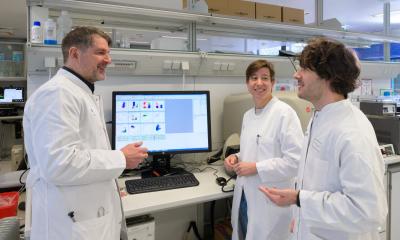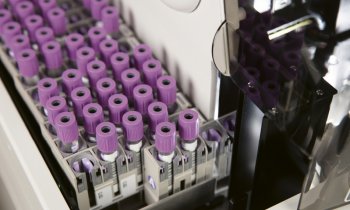
Image source: CHUM
News • Genetic signature mapping
Diagnosing Parkinson’s from a blood sample
Parkinson’s disease is best known for its effects on the central nervous system. In addition, recent scientific advances generally emphasize the role of the immune system in the presence and development of the disease.
In a study published in the journal Brain, researchers led by Université de Montréal associate professor of neuroscience Martine Tétreault show that some cell types in the immune system are activated more in patients who have Parkinson’s.
“Thanks to a new technology called single-cell RNA-seq, we can differentiate the cellular subtypes and observe gene expression at the cellular level for each cell,” explained Tétreault, a research scientist at the CRCHUM, Université de Montréal’s affiliated hospital research centre. “We found that in Parkinson’s patients, immune cells in the blood were activated and overexpressed genes associated with stress responses,” she said. “Together, these biomarkers form the signature of the disease.”
In our study, the gene signature of the disease allowed us to distinguish between patients with Parkinson’s disease and those with Parkinsonian syndromes
Martine Tétréault
Tétreault conducted the study with three co-first authors: Gaël Moquin-Beaubry, a former postdoctoral fellow in her lab, and current PhD candidates Lovatiana Andriamboavonjy and Sébastien Audet.
Noting the current lack of clinical biomarkers needed to diagnose Parkinson’s, the researchers believe that knowing the disease’s unique signature could help clinical teams diagnose it early on, from a blood sample. The set of biomarkers could also make it easier to distinguish the disease from other similar rare diseases, especially Parkinsonian syndromes such as progressive supranuclear palsy (PSP), and multiple system atrophy (MSA).
In their study, the research team analyzed blood samples from 14 CHUM patients with a confirmed diagnosis of Parkinson’s and six patients presenting with Parkinsonian syndromes, comparing them with a control group of 10 healthy people. “In our study, the gene signature of the disease allowed us to distinguish between patients with Parkinson’s disease and those with Parkinsonian syndromes,” said Tétreault. “These biomarkers could improve diagnostic reliability or facilitate participant selection for clinical trials testing the efficacy of a drug for this disease.” Her research team is now making available to other scientists a complete atlas of immune system cellular subtypes found in healthy individuals and people with Parkinson’s.
In 2024, approximately 110,000 Canadians were living with Parkinson’s disease. By 2034, that number is expected to grow to around 150,000.
Source: Centre hospitalier de l'Université de Montréal; author: Bruno Geoffroy
02.06.2025











